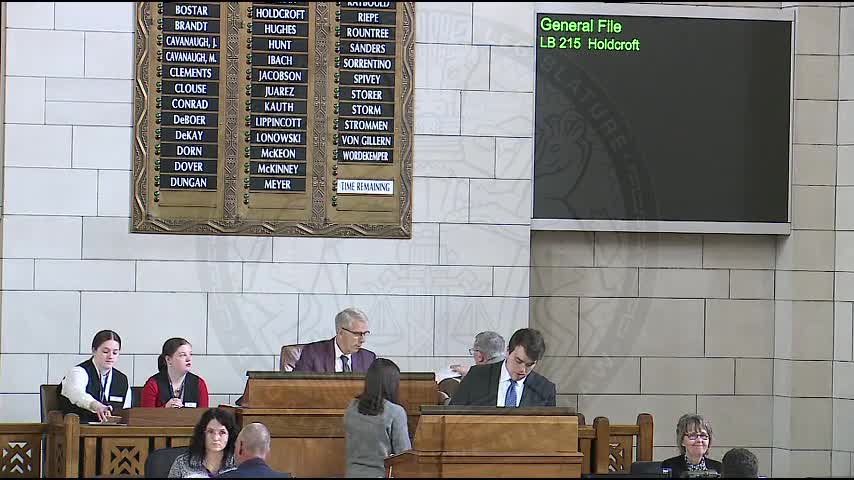Nebraska Senate passes Clean Slate Act for lifers seeking commutation
April 25, 2025 | 2025 Legislature NE, Nebraska
This article was created by AI summarizing key points discussed. AI makes mistakes, so for full details and context, please refer to the video of the full meeting. Please report any errors so we can fix them. Report an error »

The Nebraska Legislature made significant strides in criminal justice reform during its Legislative Morning Session on April 25, 2025, by adopting the Clean Slate Act. This pivotal legislation aims to provide commutations for certain lifers, allowing individuals who committed crimes at a young age a chance for rehabilitation and reintegration into society.
Senator Holcroft, a key proponent of the bill, emphasized the importance of giving second chances to those who have demonstrated rehabilitation. Under the new law, individuals who committed their crimes before the age of 26 will be eligible for commutation after serving 25 years, while those who committed crimes at 26 or older must serve 30 years. The Department of Corrections will identify eligible candidates five years prior to their eligibility, allowing the Board of Parole to conduct thorough assessments and involve community stakeholders in the decision-making process.
Holcroft highlighted the need for tailored reentry plans that include employment, housing, education, and mental health services, ensuring that individuals are supported as they transition back into society. He noted that many incarcerated individuals are model citizens who pose no threat to the community and deserve a chance to contribute positively.
The bill received broad support, with proponents including family members of incarcerated individuals, mental health organizations, and local chambers of commerce, all advocating for the potential benefits of reintegrating rehabilitated individuals into the workforce. Critics, however, raised concerns about the implications of such reforms, emphasizing the need for careful consideration of public safety.
As the session progressed, the legislature also addressed procedural amendments to refine the bill, removing the initial clean slate provisions to focus solely on the commutation process. The Board of Pardons retains the final authority on granting commutations, ensuring that public safety remains a priority.
The passage of the Clean Slate Act marks a significant shift in Nebraska's approach to criminal justice, reflecting a growing recognition of the importance of rehabilitation and the potential for individuals to become productive members of society after serving their sentences. The anticipated outcomes of this legislation could reshape the lives of many individuals and their families, fostering a more compassionate and just system.
Senator Holcroft, a key proponent of the bill, emphasized the importance of giving second chances to those who have demonstrated rehabilitation. Under the new law, individuals who committed their crimes before the age of 26 will be eligible for commutation after serving 25 years, while those who committed crimes at 26 or older must serve 30 years. The Department of Corrections will identify eligible candidates five years prior to their eligibility, allowing the Board of Parole to conduct thorough assessments and involve community stakeholders in the decision-making process.
Holcroft highlighted the need for tailored reentry plans that include employment, housing, education, and mental health services, ensuring that individuals are supported as they transition back into society. He noted that many incarcerated individuals are model citizens who pose no threat to the community and deserve a chance to contribute positively.
The bill received broad support, with proponents including family members of incarcerated individuals, mental health organizations, and local chambers of commerce, all advocating for the potential benefits of reintegrating rehabilitated individuals into the workforce. Critics, however, raised concerns about the implications of such reforms, emphasizing the need for careful consideration of public safety.
As the session progressed, the legislature also addressed procedural amendments to refine the bill, removing the initial clean slate provisions to focus solely on the commutation process. The Board of Pardons retains the final authority on granting commutations, ensuring that public safety remains a priority.
The passage of the Clean Slate Act marks a significant shift in Nebraska's approach to criminal justice, reflecting a growing recognition of the importance of rehabilitation and the potential for individuals to become productive members of society after serving their sentences. The anticipated outcomes of this legislation could reshape the lives of many individuals and their families, fostering a more compassionate and just system.
View full meeting
This article is based on a recent meeting—watch the full video and explore the complete transcript for deeper insights into the discussion.
View full meeting
